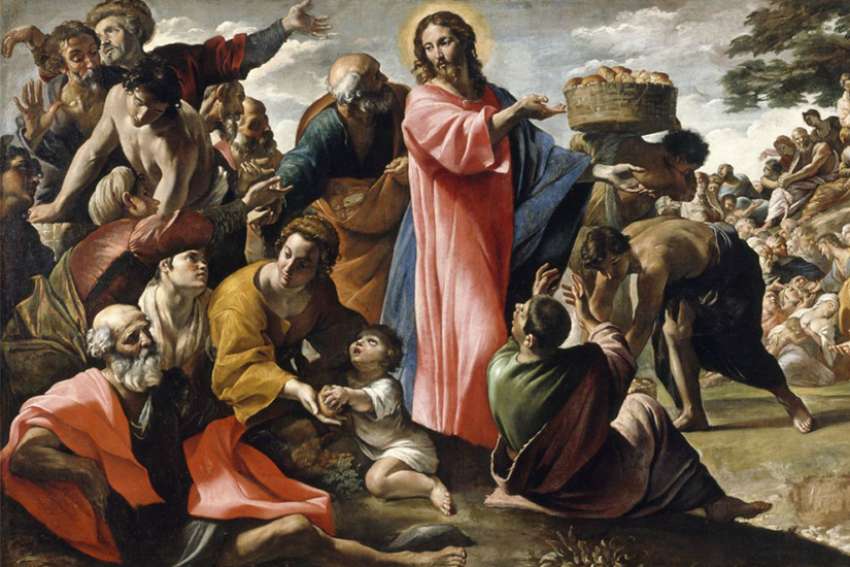"Miracle of the Bread and Fish", oil on canvas by Giovanni Lanfranco, 1623
Courtesy of the National Gallery of Ireland/Wikimedia Commons
Ian Hunter: Scraps have a place in God’s economy
By Ian Hunter
The only miracle that Jesus performed recounted in all four Gospels is the multiplication of the loaves and fishes, more commonly called the feeding of the 5,000 (or 4,000 in Mark’s Gospel, but who was counting precisely?).
At first blush, this seems odd. The miracle is less personal than restoring sight to a blind man (Mark 10:46-52) and certainly less dramatic than casting out demons (Matthew 8:28-34) or raising Lazarus from the dead (John 11:38-44). On reflection, though, perhaps the unanimity of the Gospels on this particular miracle is understandable.
When Jesus multiplied the loaves and fishes to feed those who had stayed all day in what Mark calls “a deserted place” in order to hear Jesus teach, He was revealing something important about His mission, namely, that He was the new Moses.
As Moses fed the children of Israel with manna from Heaven during their wanderings in the wilderness, so Jesus fed the crowds who had come out to listen to Him and now faced a journey home. So, here the new Moses feeds His people, an image of how, through the succeeding centuries of Christendom, Jesus will feed His people with His own body and blood by the holy Eucharist.
Mark tells us that when Jesus met the crowd in that “deserted place,” He had compassion for them because “they were like sheep without a shepherd.” This seems to me a very contemporary touch. Today Christians live in a world that is a deserted place.
In many places (e.g. many Muslim countries) Christians are actively persecuted. This is why there are more Christian martyrs in the last 100 years than in all the preceding centuries put together. In what used to be called the “Western world,” in North America and Europe, Christians are often reviled, mocked or simply ignored. Even in church, sad to say, Catholics may sometimes feel they are sheep without a shepherd.
So, what did Jesus do? First, we read that “He taught them many things” (Mark 6:34). Then He fed the people. In other words, Jesus took care first of their spiritual hunger, then their physical hunger. This should be the template for every Mass.
I know that when I attend Mass and hear the priest bang on about global warming, or the plight of refugees, or that hydra-headed subject called “social justice,” I do not feel fed — I come away undernourished.
Part of me wants to rise up in the pew and shout: “Don’t tell us about climate change; we would see Jesus!” The formula is: Teach first, then feed. It seems to me the priest has a twofold responsibility as shepherd: nurture the flock in the Catholic faith, then care for their souls.
After Jesus had fed the 5,000, He told His disciples: “Gather up the fragments left over, that nothing may be lost” (John 6:12). Again, this seems puzzling. Why should the King of Kings, the Creator of the sun, the moon and the stars, care about leftovers? Jesus had demonstrated that He could multiply loaves and fishes; why concern Himself with scraps?
I think the answer is that there is a place for scraps in God’s economy. The same God who marks the sparrow’s fall and has counted the hairs on your head, cares about leftovers. So the disciples gathered up, we are told, 12 baskets of fragments from the original five barley loaves and two small fishes.
I number myself among the fragments. I was gathered up late in life and received by grace into Christ’s Catholic Church. I was not born into a Catholic family, received no catechesis at my mother’s knee and attended no Catholic schools. The feast of my life was largely over when the Church doors swung open.
Yet in God’s economy (as the parable of the generous vineyard owner makes clear in Matthew 20:1-16), and so in God’s Church, the fragment is received with no less ardour than the first course.
The mission of the Church is to hand on, in every deserted place and to every generation, the faith once delivered to the original 12 apostles.The Church strives always to insure that no fragment is lost.
(Hunter is Professor Emeritus in the Faculty of Law at Western University.)
Please support The Catholic Register
Unlike many media companies, The Catholic Register has never charged readers for access to the news and information on our website. We want to keep our award-winning journalism as widely available as possible. But we need your help.
For more than 125 years, The Register has been a trusted source of faith-based journalism. By making even a small donation you help ensure our future as an important voice in the Catholic Church. If you support the mission of Catholic journalism, please donate today. Thank you.
DONATE

